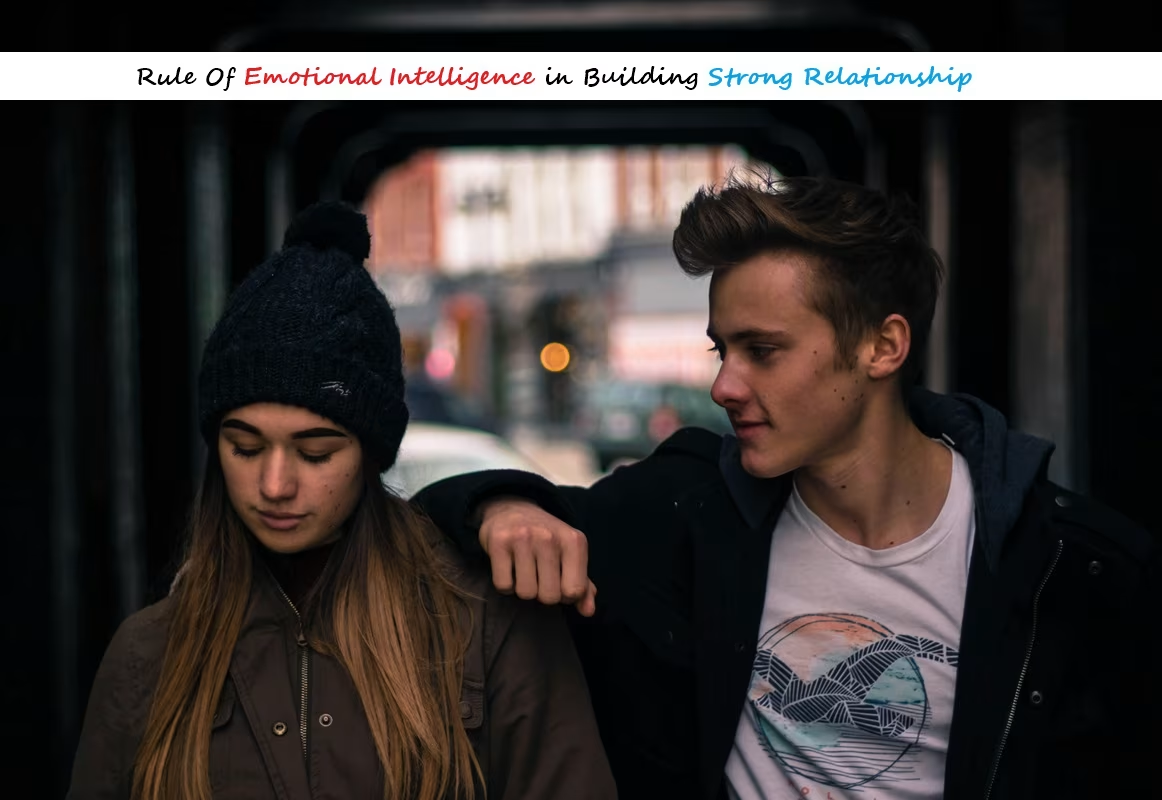Emotional intelligence (EI), often called EQ (Emotional Quotient), plays a crucial role in establishing and maintaining healthy, strong relationships—whether personal or professional. It involves the ability to understand, manage, and express one’s emotions while also recognizing and influencing the emotions of others. Unlike IQ, which measures cognitive abilities, emotional intelligence focuses on interpersonal skills and emotional awareness.
In today’s fast-paced, interconnected world, relationships are more vital than ever. Having strong relationships can lead to a more fulfilling personal life, more productive work environments, and even greater leadership potential. Here’s how emotional intelligence contributes to building these lasting connections.
6 Tips Emotional Intelligence in Building Strong Relationship
Self-Awareness: The Foundation of Emotional Intelligence
Self-awareness is the cornerstone of emotional intelligence. It involves understanding your emotions, strengths, weaknesses, and how they affect others. When you’re aware of your emotional state, you’re better equipped to regulate your behavior, especially in challenging situations.
Impact on Relationships:
- Better Communication: When you’re aware of your emotions, you’re more likely to express them clearly, which reduces misunderstandings and promotes open, honest conversations.
- Managing Triggers: Emotional self-awareness helps you identify emotional triggers, preventing impulsive reactions that could harm relationships.
Example: Imagine feeling frustrated during an argument with a friend. With high self-awareness, you recognize that frustration, pause, and respond calmly instead of lashing out. This helps keep the conversation productive and maintains the trust in the relationship.
Self-Regulation: Keeping Emotions in Check
Self-regulation refers to your ability to control and manage disruptive emotions and impulses. It’s the skill that allows you to think before you act, helping to maintain calm in heated situations.
Impact on Relationships:
- Fostering Trust: When you can manage your emotional responses, you appear more consistent, reliable, and trustworthy in your relationships.
- Conflict Resolution: Self-regulation plays a huge role in resolving conflicts peacefully. Instead of escalating a situation by reacting emotionally, you can approach it logically and empathetically.
Example: In a disagreement at work, rather than reacting defensively or angrily, self-regulation helps you stay composed and listen to the other person’s perspective, fostering a healthy dialogue and avoiding unnecessary tension.
Empathy: The Key to Deep Emotional Connection
Empathy is the ability to understand and share the feelings of another person. It’s the skill that lets you step into someone else’s shoes, which is essential for building strong, meaningful relationships.
Also Read :- This 5 Habits That Build Strong Relationships in Love
Impact on Relationships:
- Building Trust and Understanding: When others feel that you truly understand and care about their emotions, it builds trust. Empathy allows for a deeper emotional connection, which is crucial in any relationship.
- Reducing Conflict: Empathy helps to mitigate conflict by enabling you to consider the feelings of others before you react. When both parties feel heard and understood, disagreements are less likely to escalate into arguments.
Example: A friend is upset because they didn’t get the promotion they wanted. Instead of dismissing their feelings or offering a quick solution, showing empathy means listening, acknowledging their disappointment, and validating their emotions. This deepens your bond and shows that you genuinely care about their well-being.

Social Skills: Building and Maintaining Positive Interactions
Social skills, in the context of emotional intelligence, refer to the ability to interact effectively with others, manage relationships, and navigate social environments. It’s about being approachable, good at communication, and effective in both resolving conflicts and fostering collaboration.
Impact on Relationships:
- Enhanced Communication: Good social skills lead to clear, open communication, which is the backbone of any strong relationship.
- Collaboration and Teamwork: In professional settings, strong social skills can lead to better collaboration, teamwork, and leadership, all of which hinge on the ability to relate to others and work well together.
Example: In a team setting, strong social skills help you mediate disputes, encourage participation from quieter members, and ensure that everyone feels valued. These skills can transform a group into a cohesive, productive team.
Motivation: The Drive Behind Emotional Intelligence
Motivation, in this context, refers to a passion for long-term goals. Emotionally intelligent individuals are typically driven by internal motivations rather than external rewards, and they use this drive to build and sustain their relationships.
Impact on Relationships:
- Commitment to Growth: People with high emotional intelligence are committed to personal growth, which includes the effort to improve and nurture their relationships. They are motivated to overcome challenges within relationships and work through difficulties with patience and persistence.
- Positivity and Inspiration: Highly motivated individuals often inspire those around them with their enthusiasm and positive outlook, creating an uplifting atmosphere in both personal and professional relationships.
Example: In a romantic relationship, when challenges arise, someone with high emotional intelligence is motivated to resolve issues, communicate effectively, and maintain the connection, rather than giving up when things get tough.
Emotional Intelligence in Conflict Resolution
One of the most practical applications of emotional intelligence in relationships is in conflict resolution. When both parties in a conflict have a high degree of emotional intelligence, it becomes easier to reach a resolution that satisfies both sides.
How It Helps:
- Active Listening: Emotionally intelligent individuals listen more than they speak, allowing the other party to feel heard and understood. This reduces tension and opens the door for compromise.
- Finding Common Ground: By managing their own emotions and empathizing with the other person’s perspective, emotionally intelligent people are more likely to find common ground during a disagreement.
Also Read :- Top Best Life Changing Books For Personal Development
Example: During a workplace conflict, an emotionally intelligent manager listens to the concerns of their employees, addresses the root of the issue, and finds a solution that benefits both sides. This strengthens the trust and respect between the manager and the team.
Conclusion: Emotional Intelligence as the Heart of Strong Relationships
Emotional intelligence is the invisible thread that weaves strong, healthy relationships together. Whether it’s through self-awareness, empathy, or social skills, the ability to understand and manage emotions is crucial for building trust, resolving conflicts, and fostering deep emotional connections. By developing your emotional intelligence, you not only improve your relationships but also create a more fulfilling, balanced, and connected life. Whether in personal, professional, or social settings, mastering emotional intelligence is the key to building relationships that stand the test of time.


1 thought on “The Rule Of Emotional Intelligence in Building Strong Relationship”
Comments are closed.